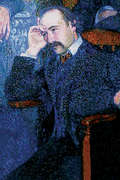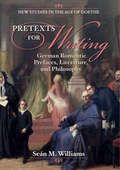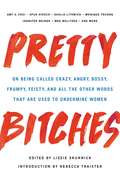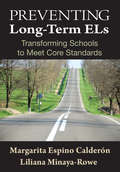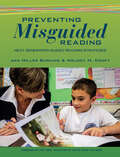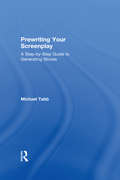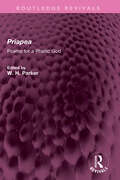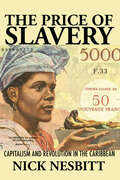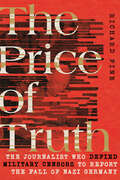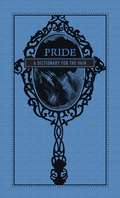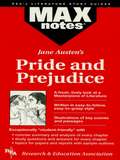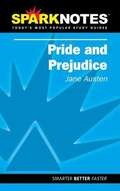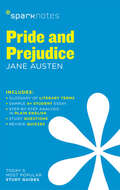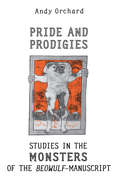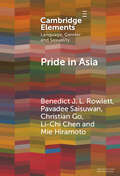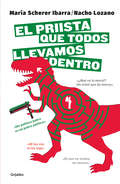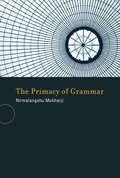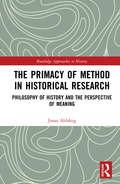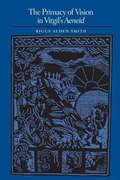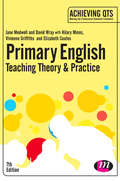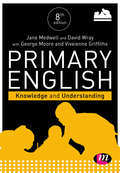- Table View
- List View
Pretexts: Reflections on Literature and Morality
by Andre GideMost of Andre Gide's richly-varied literary output has long been available to American readers. Only one aspect of his protean career has been lacking in translation: the essays, the publication of which will go far to explain why Gide holds in France such high rank as a critic. Many of the essays in Pretexts: Reflections on Literature and Morality were provoked by events in the cultural and political world of twentieth-century France, a turbulent setting that produced a lasting literature. These essays are vintage Gide, informed by his characteristic spirit his hard brilliance, pointed honesty, and the enduring relevance of his concerns.Readers of his Journals will be prepared for the style, intelligence, and marksmanship that Gide brings to bear in these forty-two articles on life as well as on letters. His range, as always, is broad: a long and moving memoir of his encounters with Oscar Wilde; a series of combats against reactionary nationalists and self-appointed purifiers of morals; estimates of Mallarme, Baudelaire, Proust, Gautier, and Valery, among others; letters to Jacques Riviere, Jean Cocteau, and Francis Jammes; and general essays on art, literature, the theater, and politics.Justin O'Brien, famous for his studies in modern French literature, has written that Gide is "related to La Fontaine and Racine by his essential conciseness and crystalline style, to Montaigne and Goethe by his inquiring mind which reconciled unrest and serenity, to Baudelaire by his lucid, prophetic criticism." O'Brien, who has done so much to bring contemporary French literature to America, supervised the translations in Pretexts: Reflections on Literature and Morality, prepared several of them himself, and contributes an informative general introduction and additional commentary to preface the various sections of this major book.
Pretexts for Writing: German Romantic Prefaces, Literature, and Philosophy (New Studies in the Age of Goethe)
by Seán WilliamsAround 1800, print culture became a particularly rich source for metaphors about thinking as well as writing, nowhere more so than in the German tradition of Dichter und Denker. Goethe, Jean Paul, and Hegel (among many others) used the preface in order to reflect on the problems of writing itself, and its interpretation. If Sterne teaches us that a material book enables mind games as much as it gives expression to them, the Germans made these games more theoretical still. Weaving in authors from Antiquity to Agamben, Williams shows how European–and, above all, German–Romanticism was a watershed in the history of the preface. The playful, paradoxical strategies that Romantic writers invented are later played out in continental philosophy, and in post-Structuralist literature. The preface is a prompt for playful thinking with texts, as much as it is conventionally the prosaic product of such an exercise. Published by Bucknell University Press. Distributed worldwide by Rutgers University Press.
Pretty Bitches: On Being Called Crazy, Angry, Bossy, Frumpy, Feisty, and All the Other Words That Are Used to Undermine Women
by Lizzie SkurnickThese empowering essays from leading women writers examine the power of the gendered language that is used to diminish women -- and imagine a more liberated world.Words matter. They wound, they inflate, they define, they demean. They have nuance and power. "Effortless," "Sassy," "Ambitious," "Aggressive": What subtle digs and sneaky implications are conveyed when women are described with words like these? Words are made into weapons, warnings, praise, and blame, bearing an outsized influence on women's lives -- to say nothing of our moods.No one knows this better than Lizzie Skurnick, writer of the New York Times' column "That Should be A Word" and a veritable queen of cultural coinage. And in Pretty Bitches, Skurnick has rounded up a group of powerhouse women writers to take on the hidden meanings of these words, and how they can limit our worlds -- or liberate them. From Laura Lipmann and Meg Wolizer to Jennifer Weiner and Rebecca Traister, each writer uses her word as a vehicle for memoir, cultural commentary, critique, or all three. Spanning the street, the bedroom, the voting booth, and the workplace, these simple words have huge stories behind them -- stories it's time to examine, re-imagine, and change.
Preventing Long-Term ELs: Transforming Schools to Meet Core Standards
by Margarita Espino Calderon Dr Liliana Minaya-Rowe10 keys to keeping English learners from falling through the cracks Students who struggle with English are likely to struggle with academic content throughout their school years. Many drop out. This practical guidebook’s 10 components for success will help educators at all levels close this achievement gap. Included are step-by-step instructions for integrating language, literacy, and subject matter to improve student learning. Key features include: A clearly articulated, evidence-based professional development program for effectively teaching English language learners Research-based coaching practices for improving instruction Ways to implement the program while concurrently meeting core standards and content objectives
Preventing Misguided Reading: Next Generation Guided Reading Strategies
by Jan Burkins Melody M. CroftWith over 50 years of collective reading experience, authors Jan Burkins and Melody Croft bring their expertise to Preventing Misguided Reading: Next Generation Guided Reading Strategies . The authors present personal clarifications, adaptations, and supports that have helped them work through the tricky parts as they guide readers in the classroom. Inside, each of the six chapters clarifies a misunderstanding about guided reading instruction in the following areas: Teacher's Role and Gradual Release of Responsibility Instructional Reading Level Text Gradients Balanced Instruction Integrated Processing Assessment With 27 strategies, Burkins and Croft will help you reframe your way of thinking about teaching reading and act on "revisioning" strategically.
Prewriting Your Screenplay: A Step-by-Step Guide to Generating Stories
by Michael TabbPrewriting Your Screenplay cements all the bricks of a story’s foundations together and forms a single, organic story-growing technique, starting with a blank slate. It shows writers how to design each element so that they perfectly interlock together like pieces of a puzzle, creating a stronger story foundation that does not leave gaps and holes for readers to find. This construction process is performed one piece at a time, one character at a time, building and incorporating each element into the whole. The book provides a clear-cut set of lessons that teaches how to construct that story base around concepts as individual as the writer’s personal opinions, helping to foster an individual writer’s voice. It also features end-of-chapter exercises that offer step-by-step guidance in applying each lesson, providing screenwriters with a concrete approach to building a strong foundation for a screenplay. This is the quintessential book for all writers taking their first steps towards developing a screenplay from nothing, getting them over that first monumental hump, resulting in a well-formulated story concept that is cohesive and professional.
Priapea: Poems for a Phallic God (Routledge Revivals)
by W. H. ParkerFirst published in 1988, Priapea is a collection of eighty Latin epigrams, English translated, that make up the corpus Priapeorum, which displays remarkable skill, artistry and wit. Their elegance of style contrasts strikingly with their indecent subject matter. The poems are mostly spoken by, or addressed to, the lewd god Priapus, famous for the size and tenseness of his erect membrum virile or phallus. A main theme is the threatened use of his formidable organ to assault obscenely any intruders that he may catch thieving, but requests and offsprings made to Priapus, and his comparison of himself with other deities, also figure prominently among the poems. This book will be of interest of literature, classical studies, and translation studies.
The Price of Slavery: Capitalism and Revolution in the Caribbean (New World Studies)
by Nick NesbittThe Price of Slavery analyzes Marx’s critique of capitalist slavery and its implications for the Caribbean thought of Toussaint Louverture, Henry Christophe, C. L. R. James, Aimé Césaire, Jacques Stephen Alexis, and Suzanne Césaire. Nick Nesbitt assesses the limitations of the literature on capitalism and slavery since Eric Williams in light of Marx’s key concept of the social forms of labor, wealth, and value. To do so, Nesbitt systematically reconstructs for the first time Marx’s analysis of capitalist slavery across the three volumes of Capital. The book then follows the legacy of Caribbean critique in its reflections on the social forms of labor, servitude, and freedom, as they culminate in the vehement call for the revolutionary transformation of an unjust colonial order into one of universal justice and equality.
The Price of Truth: The Journalist Who Defied Military Censors to Report the Fall of Nazi Germany
by Richard FineIn The Price of Truth, Richard Fine recounts the intense drama surrounding the German surrender at the end of World War II and the veteran Associated Press journalist Edward Kennedy's controversial scoop. On May 7, 1945, Kennedy bypassed military censorship to be the first to break the news of the Nazi surrender executed in Reims, France. Both the practice and the public perception of wartime reporting would never be the same. While, at the behest of Soviet leaders, Allied authorities prohibited release of the story, Kennedy stuck to his journalistic principles and refused to manage information he believed the world had a right to know. No action by an American correspondent during the war proved more controversial.The Paris press corps was furious at what it took to be Kennedy's unethical betrayal; military authorities threatened court-martial before expelling him from Europe. Kennedy defended himself, insisting the news was being withheld for suspect political reasons unrelated to military security. After prolonged national debate, when the dust settled, Kennedy's career was in ruins. This story of Kennedy's surrender dispatch and the meddling by Allied Command, which was already being called a fiasco in May 1945, revises what we know about media-military relations. Discarding "Good War" nostalgia, Fine challenges the accepted view that relations between the media and the military were amicable during World War II and only later ran off the rails during the Vietnam War. The Price of Truth reveals one of the earliest chapters of tension between reporters committed to informing the public and generals tasked with managing a war.
Pride: A Dictionary for the Vain
by Media AdamsThe Seven Deadly Sins have sliced up the dictionary and taken what's theirs. No one vice is too greedy as each volume prides itself on having more than 500 entries. Word lovers will lust after these richly packaged volumes--and once you've collected all seven, you'll be the envy of all your friends.Pride: A Dictionary for the VainNo one enjoys lording over the uneducated with a pretty pointed vocabulary like the Prideful. Now each and every word they need to describe how much better they are is right at their fingertips.
Pride and Prejudice and Related Readings
by Jane AustenThe related readings are: Society from What Jane Austen Ate and Charles Dickens Knew by Daniel Pool (social history), The Best Sort of Husband by Susan B. Kelly (short story), Austen Boom Shows an Un-American Craving for Civility by Henry Grunwald (newspaper article), Habitation by Margaret Atwood (poem), and Autres Temps by Edith Wharton (short story). [This text is listed as an example that meets Common Core Standards in English language arts in grades 11-12 at http://www.corestandards.org.]
Pride and Prejudice (MAXNotes Literature Guides)
by William BlanchardREA's MAXnotes for Jane Austen's Pride and Prejudice MAXnotes offer a fresh look at masterpieces of literature, presented in a lively and interesting fashion. Written by literary experts who currently teach the subject, MAXnotes will enhance your understanding and enjoyment of the work. MAXnotes are designed to stimulate independent thought about the literary work by raising various issues and thought-provoking ideas and questions. MAXnotes cover the essentials of what one should know about each work, including an overall summary, character lists, an explanation and discussion of the plot, the work's historical context, illustrations to convey the mood of the work, and a biography of the author. Each chapter is individually summarized and analyzed, and has study questions and answers.
Pride and Prejudice (SparkNotes)
by Ross Douthat Molly Haskel Jennifer BurnsSparknotes of Pride and Prejudice, Jane Austen's masterpiece
Pride and Prejudice SparkNotes Literature Guide (SparkNotes Literature Guide Series #55)
by SparkNotesPride and Prejudice SparkNotes Literature Guide by Jane Austen Making the reading experience fun! When a paper is due, and dreaded exams loom, here's the lit-crit help students need to succeed! SparkNotes Literature Guides make studying smarter, better, and faster. They provide chapter-by-chapter analysis; explanations of key themes, motifs, and symbols; a review quiz; and essay topics. Lively and accessible, SparkNotes is perfect for late-night studying and paper writing. Includes:An A+ Essay—an actual literary essay written about the Spark-ed book—to show students how a paper should be written.16 pages devoted to writing a literary essay including: a glossary of literary termsStep-by-step tutoring on how to write a literary essayA feature on how not to plagiarize
Pride and Prodigies
by Andy OrchardMonsters and the monstrous, whether from the remote pagan past or the new world of Christian Latin learning, haunted the Anglo-Saxon imagination in a variety of ways. In this series of detailed studies, Andy Orchard demonstrates the changing range of Anglo-Saxon attitudes towards the monstrous by reconsidering the monsters of Beowulf against the background of early medieval and patristic teratology and with reference to specific Anglo-Saxon texts.The immediate manuscript context of the monsters in Beowulf is analysed, shedding light on the poet's treatment of the theme of the monstrous and its integration into his work, and a series of parallel discussions consider a range of medieval treatments of the same theme in a variety of analogous texts (all provided with translation), in Latin, Old English, Middle Irish, and Old Icelandic.The twin themes of pride and prodigies are suggested by tracing changing attitudes towards the concept of pride and establishing a close link between the proud pagan warriors depicted in Christian tradition and the monsters they fight, and with whom they become increasingly identified.An appendix contains new editions and translations (some for the first time in English) of the Liber Monstrorum, The Letter of Alexander to Aristotle, and The Wonders of the East.Originally published in 1995 by Boydell & Brewer.
Pride in Asia: Negotiating Ideologies, Localness, and Alternative Futures (Elements in Language, Gender and Sexuality)
by Benedict J. Rowlett Pavadee Saisuwan Christian Go Li-Chi Chen Mie HiramotoThis Element provides a transregional overview of Pride in Asia, exploring the multifaceted nature of Pride in contemporary LGBTQIA+ events in Thailand, the Philippines, Taiwan, and Hong Kong. This collaborative research that combines individual studies draws on linguistic landscapes as an analytical and methodological approach. Each section examines the different manifestations of Pride as a discourse and the affordances and limitations of this discourse in facilitating the social, political, and cultural projects of LGBTQIA+ people in Asia, illustrating both commonalities and specificities in Asian Pride movements. Analyzing a variety of materials such as protest signs, t-shirts, and media reports, each section illustrates how modes of semiosis, through practice, intersect notions of gender and sexuality with broader social and political formations. The authors thus emphasize the need to view Pride not as a uniform global phenomenon but as a dynamic, locally shaped expression of LGBTQIA+ solidarity.
El priista que todos llevamos dentro
by María Scherer Nacho LozanoCómico y trágico a la vez, El priista que llevamos dentro recuerda una sentencia que se ha tratado en más de un discurso, incluso por quienes niegan la cruz de su parroquia: ¿tenemos un priista interior?María Scherer Ibarra y Nacho Lozano, destacados periodistas de la fuente política, comparten en este libro una reflexión para todos los tiempos y el resultado de desenmascarar un rasgo que nos afecta a todos. Si la modernidad en México nació con el final de la Revolución , sería prudente pensar que heredamos algo de aquellos que nos formaron. Pero queda pendiente una pregunta después de toda una historia sin demasiados cambios: ¿tenemos una huella genética que se dejó alcanzar por una cultura priista? Una conclusión es segura: todo cabe en un priista sabiéndolo acomodar."¿Qué es la moral? Un árbol que da moras""Un político pobre es un pobre político""Ni los veo ni los oigo""El que no transa no avanza"
The Primacy of Grammar
by Nirmalangshu MukherjiA proposal that the biolinguistic approach to human languages may have identified, beyond the study of language, a specific structure of the human mind.The contemporary discipline of biolinguistics is beginning to have the feel of scientific inquiry. Biolinguistics—especially the work of Noam Chomsky—suggests that the design of language may be “perfect”: language is an optimal solution to conditions of sound and meaning. What is the scope of this inquiry? Which aspect of nature does this science investigate? What is its relation to the rest of science? What notions of language and mind are under investigation? This book is a study of such foundational questions. Exploring Chomsky's claims, Nirmalangshu Mukherji argues that the significance of biolinguistic inquiry extends beyond the domain of language.Biolinguistics is primarily concerned with grammars that represent just the computational aspects of the mind/brain. This restriction to grammars, Mukherji argues, opens the possibility that the computational system of human language may be involved in each cognitive system that requires similar computational resources. Deploying analytical argumentation and empirical evidence, Mukherji suggests that a computational system of language consisting of very specific principles and operations is likely to be involved in each articulatory symbol system—such as music—that manifests unboundedness. In that sense, the biolinguistics approach may have identified, after thousands of years of inquiry, a specific structure of the human mind.
The Primacy of Method in Historical Research: Philosophy of History and the Perspective of Meaning (Routledge Approaches to History #40)
by Jonas AhlskogHow does history relate to the past? According to leading historical theorists, the relation to the past in history is reducible to evidential, psychological, practical and retrospective concerns. In contrast, this volume claims that historical relations to the past are irreducible products of the logical commitments of history as method. Ahlskog argues that the method of history shapes and enables relations to the past in historical research by invoking past perspectives of meaning for rendering reality intelligible. The book provides a much-needed philosophical clarification of key concepts in one of the most fundamental debates within the humanities today.
The Primacy of Semiosis
by Paul BainsHow do things come to stand for something other than themselves? An understanding of the ontology of relations allows for a compelling account of the action of signs. The Primacy of Semiosis is concerned with the ontology of relations and semiosis, the action of signs. Drawing upon the work of Gilles Deleuze, John Deely, and John Poinsot, Paul Bains focuses on the claim that relations are 'external' to their terms, and seeks to give an ontological account of this purported externality of relations.Bains develops the proposition, first made in 1632 by John Poinsot (John of St. Thomas), that, ontologically, signs are relations whose whole being is in esse ad ('being-toward'). Furthermore, relations are found to be univocal in their being as relations. This univocity of being is antecedent to the division between 'ens rationis' and 'ens reale'. The ontology of relations Bains presents is thus neither mind-dependent nor mind-independent insofar as the rationale of the relation is concerned.The book includes chapters on Deleuze and Deely on relations, Jacob von Uexkull and Heidegger on Umwelten (self-worlds), Maturana and Varela on Autopoieis. It provides the vicarious causality, by way of the scholastic doctrine of the 'species', that is now being resuscitated by Graham Harman and the emerging school of 'object oriented ontology'.The Primacy of Semiosis provides a semiotic that subverts the opposition between realism and idealism; one in which what have been called 'nature' and 'culture' interpenetrate in an expanding collective of human and non-human. Bains' work promises to be a touchstone for semiotic discussion for years to come.
The Primacy of Vision in Virgil's Aeneid
by Riggs Alden SmithOne of the masterpieces of Latin and, indeed, world literature, Virgil's Aeneid was written during the Augustan "renaissance" of architecture, art, and literature that redefined the Roman world in the early years of the empire.<P><P> This period was marked by a transition from the use of rhetoric as a means of public persuasion to the use of images to display imperial power. Taking a fresh approach to Virgil's epic poem, Riggs Alden Smith argues that the Aeneid fundamentally participates in the Augustan shift from rhetoric to imagery because it gives primacy to vision over speech as the principal means of gathering and conveying information as it recounts the heroic adventures of Aeneas, the legendary founder of Rome.
Primary English: Audit and Test
by Doreen ChallenThis book supports trainees on primary initial teacher training courses where a secure knowledge and understanding of English is required for the award of Qualified Teacher Status (QTS). A rigorous test enables trainees to identify their strengths and weaknesses in English and this can be revisited in order to monitor and evaluate progress towards QTS. Trainees are able to direct their studies more usefully and quickly develop confidence in topics they find difficult. This edition is fully up to date with the 2007 QTS Standards.
Primary English: Teaching Theory and Practice (Sixth Edition)
by Elizabeth A. Coates David Wray Jane A. Medwell Vivienne Griffiths Hilary MinnsThe Sixth Edition of this popular core text provides the essential teaching theory and practice for primary English. It promotes effective teaching through secure pedagogical knowledge, covering the key skills of planning, monitoring and assessment and class management, and relating these specifically to primary English. This Sixth Edition is linked to the 2012 Teachers' Standards. With full coverage of the theory and practice required for effective and creative English teaching, this text is an essential guide for all trainees working towards QTS. Throuhgout, practical guidance and features support trainees to translate this learning to the classroom, embed ICT in their lessons and to understand the wider context of their teaching. Trainees will find it helpful to use this book alongside Primary English Knowledge and Understanding. About the Achieving QTS series All the books in this successful series support trainees through their initial teacher training and guide them in the acquisition of their subject knowledge, understanding and classroom practice. All new titles within the series link to the 2012 Teachers' Standards and take into accont recent changes in Initial Teacher Training. Jane Medwell is an Associate Professor of Education at the Institute of Education, University of Warwick. David Wray is Professor of Literacy Education at the Institute of Education, University of Warwick. Hilary Minns co-ordinates primary English courses in the Institute of Education, University of Warwick. Elizabeth Coates works in the Institute of Education, University of Warwick, where she co-ordinate Early Years courses. Vivienne Griffiths is Professor of Education at Canterbury Christ Church University.
Primary English
by Jane MedwellThe essential subject knowledge text for primary English. Secure subject knowledge and understanding is the foundation of confident, creative and effective teaching. The 5th edition of this popular text has a number of new features including a new self assessment section and M level extension boxes to provide further challenge in all chapters. References to the 2007 QTS Standards and the Early Years Foundation Stage are also included. With full coverage of the English curriculum, and updated research summaries reflecting the latest thinking, this text is written to help trainee primary teachers develop and consolidate their knowledge of English.
Primary English: Knowledge And Understanding (Achieving QTS Series)
by Jane A Medwell Professor David Wray Mr George E Moore Dr Vivienne GriffithsNow with online resources to support subject knowledge! Secure subject knowledge and understanding is the foundation of confident, creative and effective teaching. To help your students master this, the 8th edition of this established text now comes with a range of online resources available on the brand new companion website including: Interactive English subject knowledge audit: to assess your students subject knowledge in primary English. Save valuable teaching time at the start of the year by setting is as a pre-course audit and ensure students have an accurate picture of their ability before they begin. Grading your students' overall performance, results can be shared with you immediately and include further reading suggestions so students can revisit areas where they require improvement. Reflective self-assessment questions: more than 70 ‘check your learning’ questions help consolidate students’ understanding of each chapter topic and monitor their learning as they work through the book. Irregular verbs: a handy reference of all the irregular verbs so trainees can teach English confidently. Glossary: building students' knowledge, the full online glossary of terms for English helps them know their ‘digraph’ from your ‘soliloquy’. This 8th edition, covering the whole primary curriculum, also includes new chapters on handwriting and the nature of learning. Updated interactive activities throughout the book engage students in their learning and enable discussion. Using this book in conjunction with the free online resources really makes this the complete package for developing English subject knowledge.
